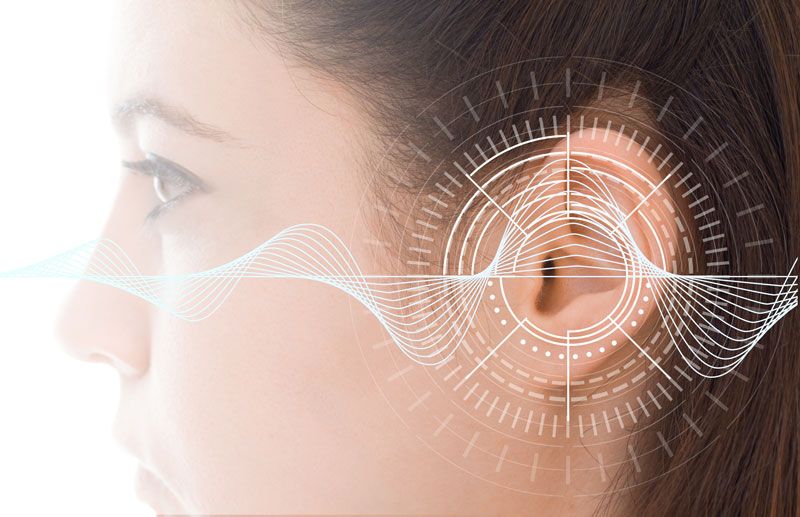Tinnitus Symptoms Are Manageable – We Can Help
If you’re experiencing tinnitus, you might feel like it’s all in your head. While that’s technically correct—in most forms of tinnitus, the sound is only audible to you, but that doesn’t mean you have to deal with it on your own. Our team at The McGuire Hearing Center can help you manage your tinnitus to reduce its impact on your daily life.
What Is Tinnitus?
Tinnitus is a ringing noise in one or both ears that might be constant or come and go. It can last anywhere from a few days to years. Ringing is one of the most common sounds, but tinnitus can also manifest as buzzing, roaring, clicking, hissing or humming. In extreme cases, it might interfere with your ability to concentrate or lead to anxiety.
What Causes Tinnitus?
The following can potentially lead to tinnitus:
- Consistent exposure to loud noise
- Issues in the middle ear, like infections or vascular tumors
- Ear infection or ear canal blockage
- Medication that damages the middle ear’s nerves, such as ototoxic drugs
- Head or neck injuries
Types of Tinnitus
The most common form of tinnitus is subjective tinnitus or tinnitus that only you can hear. This type of tinnitus often sounds like ringing, buzzing or clicking.
Less frequently diagnosed is pulsatile or objective tinnitus, which sounds like a whooshing or pulsing sound. A practitioner may be able to hear pulsatile tinnitus during an examination.


What Happens During a Tinnitus Evaluation?
Tinnitus is typically diagnosed based on a patient’s symptoms. Our office will provide a referral to connect you with these services. To determine an underlying cause, our provider will ask what noises are present. Does it sound like clicking, pulsing, low-pitched ringing or high-pitched ringing?
Other common tests include:
- Hearing exam: In a sound-proof room, you will wear headphones connected to a device that sends sounds to one ear at a time. You’ll be asked to press a button or raise your hand whenever you hear a sound.
- Movement: If the tinnitus changes due to certain movements, it might identify another disorder in need of treatment.
- Imaging tests: These might include CT or MRI scans.
- Lab tests: These might include drawing blood.
The provider may also have you take questionnaires to determine the impact of tinnitus on your daily life. These include:
- Tinnitus functional index
- Tinnitus handicap inventory
- Tinnitus and hearing survey
Ways of Managing Tinnitus
If testing suggests the need for medical intervention to manage an underlying disorder, our team will connect you with the provider that can help. Options for management might include:
- Hearing aids: A majority of tinnitus patients also experience hearing loss. Hearing aids are used to amplify background sounds, which can mask tinnitus.
- Acoustic therapy: This involves using sound to cover up or mask the perception of tinnitus.
- Counseling: Techniques like cognitive behavioral therapy, or CBT, can help reduce the stress, anxiety and sleeplessness that often arise as a side effect of tinnitus.
- Tinnitus retraining therapy: This option includes both counseling and acoustic therapy.
Acoustic Therapy Can Sound However You’d Like It To
A significant element of tinnitus treatment is acoustic therapy. The goal is to choose sounds that mask the tinnitus but aren’t intrusive or annoying. Though behind-the-ear wearable devices are one option, you might also consider mp3 files, smartphone apps or sound generators to help avoid silence.
Potential options include:
- White noise
- Gentle music
- Nature sounds
Counseling Can Provide Additional Support
Counseling can connect you with emotional coping techniques and strategies that will, in turn, help reduce potential side effects of tinnitus, including depression, fatigue and insomnia. By eliminating your anxiety around tinnitus, the noises no longer seem like a danger, and you’ll be able to focus on other things.
How Does Tinnitus Retraining Therapy Work?
Three big elements of tinnitus retraining therapy are:
- An evaluation of your daily habits and history
- Fitting of a noise-generating device that helps cancel or muffle tinnitus auditory frequencies
- Counseling to help you learn to manage and ignore tinnitus symptoms
The goal of tinnitus retraining therapy is to teach patients about their condition and ways to change how they react to and perceive the sound of tinnitus, ultimately removing the emotional reaction to it. Acoustic therapy will help mask the sound, and counseling will reduce the bothersome elements of the noise.


You Aren’t In this Alone
Tinnitus might seem daunting, but you don’t have to face it yourself. At The McGuire Hearing Center, we can help you manage your symptoms. Whether it’s providing you with more information about tinnitus or helping you find acoustic therapy, we’re here to help.
Call The McGuire Hearing Center at (937) 293-7877 for more information or to schedule an appointment.